Don’t let a weight-loss plateau discourage you
One challenging part of weight loss is finding the right diet and exercise program that fits with your lifestyle and shows results. But once you find that, sometimes the results slow or stop—and you hit a plateau. Don’t let this discourage you. Instead, check out these tips to get over a weight-loss plateau.

Keep a food diary
Start writing down everything you eat (yes, even the last two bites of your kid’s last chicken nugget or the 12 jelly beans from your coworker’s desk). “Look at what foods you’ve been choosing that are holding you up and what are the quantities,” says Amari Thomsen, MS, RD, LDN, dietitian, and founder of Eat Chic Chicago. This may help you pinpoint the problem behind your weight-loss plateau, whether it’s the food you eat or their portion sizes. Check out these nutritionists’ best healthy-eating tricks.
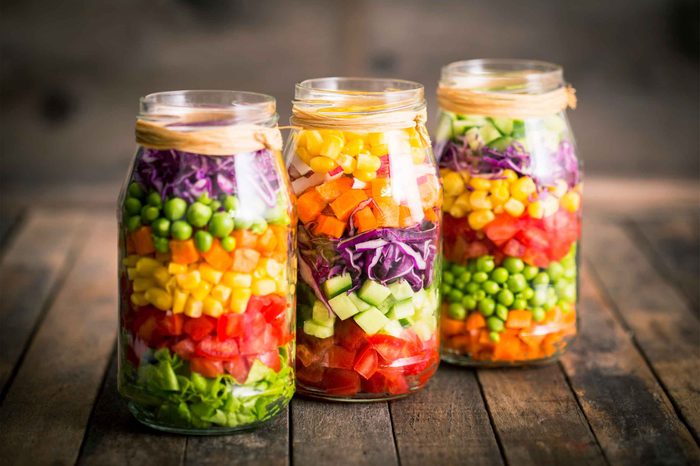
Make a plan—then mix it up
Planning can mean the difference between packing a healthy lunch and grabbing the first thing you see when your stomach starts rumbling. But if you always go for the same standbys, you could get sick of your healthy choices, says Rachel Goldman, PhD, FTOS, senior bariatric psychologist at the Bellevue Center for Obesity & Weight Management and clinical assistant professor, department of psychiatry at the NYU School of Medicine. “Make it interesting so you’re not getting bored,” she says. For instance, salads are easy and convenient, but rotating your protein between chicken, hardboiled eggs, and tuna could keep your taste buds happy, she says. Here’s more on how to have a healthy, happy lunch break.
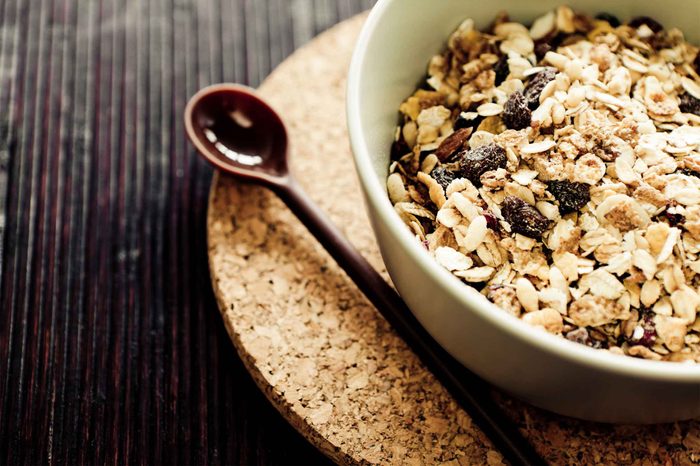
Cut down—even on the healthy stuff
Just because you buy your snacks at a health food store doesn’t mean you can eat them with abandon. “They’re associated as being healthy because of where they’re purchased and they have healthy ingredients,” says Danielle Pashko, author of Breaking Your Fat Girl Habits: Weight Loss Mistakes Even Healthy Chicks Make! But “health” foods like veggie chips, granola, and dried fruit—while fine in moderation—won’t keep you full for long, she says. If you eat the whole bag before feeling satisfied, you could be chowing down on hundreds of calories. Pick up an individual, portion-controlled fruit like an apple or nectarine instead, she says. These inspirational weight-loss stories will motivate you to reach your goals.
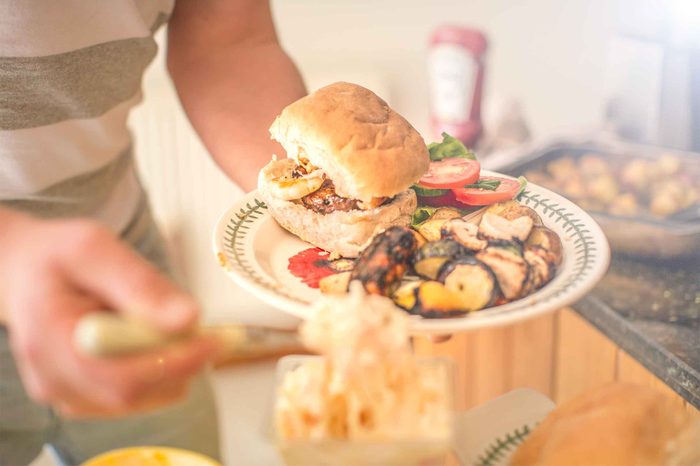
Don’t wait until you’re starving to eat
If your diet is too restrictive and you’re trying to limit yourself to two meals a day, your efforts could be working against you, says Goldman. “When we starve ourselves and go long hours or are too restrictive, that can backfire,” she says. “It’s hard to control cravings when you’re hungry, and you’ll end up overeating.” She recommends eating a light, healthy breakfast within an hour and a half of waking up, then refueling about every four hours for the rest of the day to keep you from overindulging and preventing a weight-loss plateau in the future. This is how to lose weight at work without even trying.
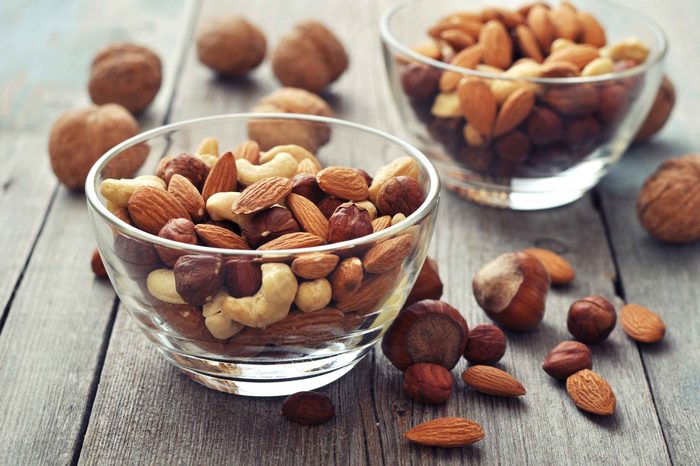
Measure out portions
Even in healthy foods, calories add up. Your definition of a handful of nuts might be four times bigger than an actual serving size, says Thomsen. “One of the foods people love are healthy fats, which are great,” she says. “Just make sure you’re keeping track of how much of those foods you’re eating, and you’re eating proper portion sizes.” Don’t miss this genius guide to measuring portions.

Don’t let your exercise routine get routine
What started as a challenging workout might not leave you breathless and sore like it did before. That’s because your body gets used to things quickly, says Goldman. “A weight-loss plateau is a sign that we have to change something,” she says. “Your body is used to where it is now—it’s comfortable. You have to shake up the body a bit and challenge it.” Instead of walking at the same pace for your daily walk, change the speed every few minutes or bump up the incline if you’re on a treadmill, Goldman recommends. These tricks will give you a flat belly without exercise.

Eat slower
It takes about 20 minutes for your brain to realize you’re full—and by that time you’ve probably already gone back for seconds, says Goldman. Eating slowly can help your brain play catch-up with your stomach so that you don’t continue eating. One easy way to slow your pace is by putting down your fork between bites. “If you’re holding your utensil the whole time, it’s easy to shovel food in your mouth,” Goldman says. “But if you consciously put it down while you chew and don’t pick it up until you’ve swallowed, it automatically slows down your eating.”
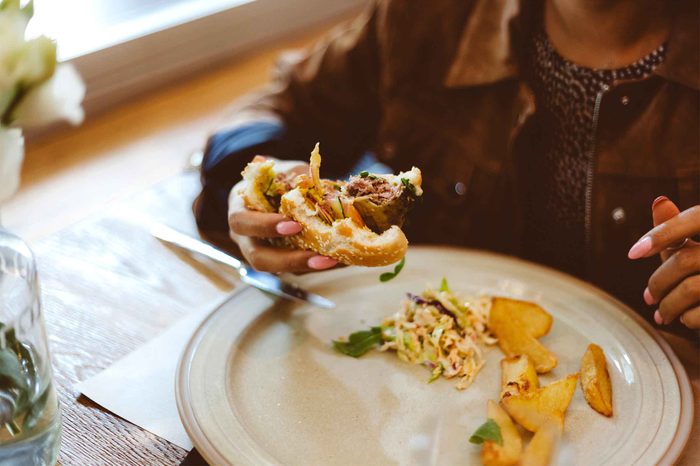
Don’t fast before a big meal
You might be tempted to “save” your calories for a big meal, but that strategy can backfire, says Pashko. If you’re full when you sit down to eat, you’ll probably end up eating those calories you skipped earlier—and then some. “If you’re not that hungry, it will save you if you’re inclined to normally eat an appetizer or breadbasket,” she says. “What you invest in a snack is way less than an appetizer would be.” Pick a protein-full food to ward off hunger two hours before dinner. These are some signs you’re not eating enough protein.

Team up with your family
You might be able to satisfy your crunchy cravings with baby carrots—until you see that bag of your partner’s favorite BBQ chips in the pantry. “A lot of people find they have [trigger foods] not because it’s their intention to eat it, but because they bought it for someone else,” says Thomsen. “It’s beneficial to get the whole family on board with your goals and getting you to succeed.” Find healthy snacks that your spouse and kids will enjoy, and keep those unhealthy temptations out of the house.

Cut out the “diet” food
Replacing your favorite chocolate ice cream with frozen yogurt or a sugar-free icy treat could easily get out of hand if you keep going back for seconds (or thirds). “It’s better to have a few bites of the real thing and be satisfied than overeating a huge serving of diet dessert,” Pashko says. “It’s really not ‘diet’ food, because you eat a lot more, thinking it’s OK.”
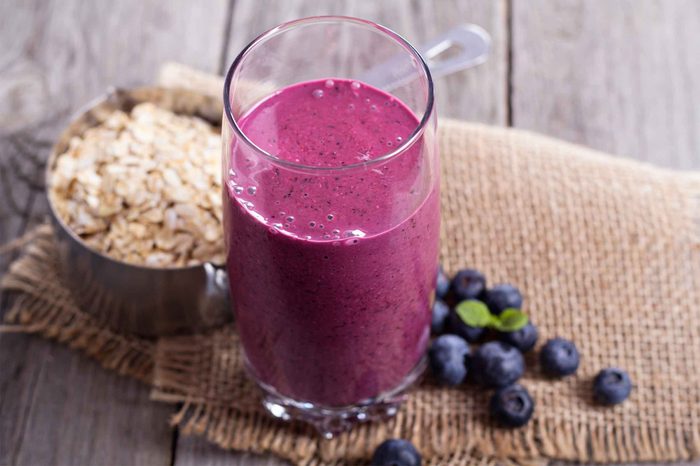
Save big meals for after the gym
If you eat breakfast before going for a run, you’ll likely end up hungry enough for a second meal before you even leave for the office, says Pashko. Have a small snack before you start your workout, but save the big meal for later for your post-workout refuel. Don’t miss these healthy breakfast mistakes.

Don’t drink your calories
“Alcohol and soda are more deceiving because they’re in liquid form, and people have them in addition to what they’re eating on a regular basis,” says Thomsen. Make a habit of swapping out sugary drinks for water. At social events, try replacing every other drink with sparkling water so you can enjoy a “real” drink without going overboard to stay on track and avoid a potential weight-loss plateau.

Find a healthy stress buster
If it’s been a stressful day, you might be looking forward to a big bowl of ice cream. But emotional eating can quickly derail a day of good intentions. “You need to think about the cause and why you’re craving that food, then participate in a nonfood alternative behavior at that time,” says Goldman. Sign up for a kickboxing course to beat out that bad energy, or cozy up with a good book to get your mind off it. These mind tricks will help you stop emotional eating.

Be realistic
“People tend to give up easily,” says Goldman. “They think if they lost five pounds in the first week, that’s realistic for every week.” Tempting as it might be to fall back into your old routine if you’re not seeing results, be patient. If you’re persistent, you’ll probably start seeing changes in your body in another week or two, Goldman says. Here’s how to literally lose weight in your sleep.

Don’t aim for fat-free
You might think a nonfat cup of Greek yogurt is your best bet for steering clear of any weight-loss plateau, but choosing one with a little fat will actually help you eat fewer calories in the long run. “That 4 grams of fat is negligible and keeps you fuller longer,” Pashko says. Once you sit down for your next meal, you won’t be ravenously loading your plate with extra food.

Shop in the supermarket’s perimeters
When stocking up on groceries, plan to snack on and cook with simple ingredients like fruits, vegetables, meats, and nuts that you’ll find in the outside aisles. “It makes it easier to wade through the junk food,” says Thomsen. “There’s no need to go down the aisles where those foods that might derail your weight-loss efforts are located.” That way you won’t be tempted to pick up a bag of potato chips when you’re on the hunt for air-popped popcorn.
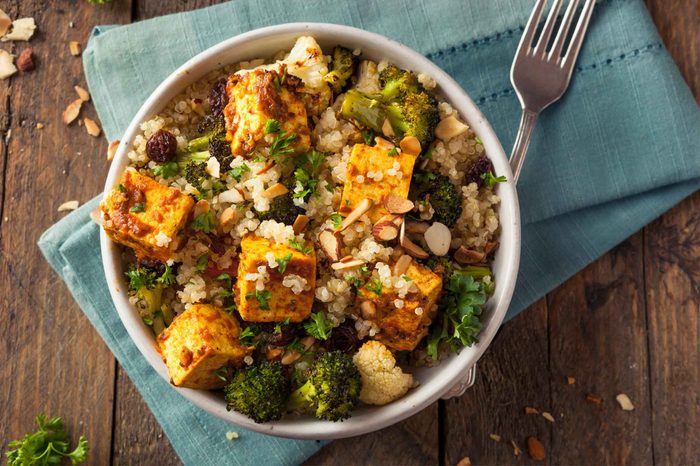
Downsize your dishes
“We’re used to filling up our plates and eating what’s on our plate,” says Goldman. Swap out your large dinner plate for a salad plate or bowl, she recommends. You’ll probably end up dishing less—and eating less—without even realizing it. Here are more ways to organize your kitchen to help you eat healthier.
